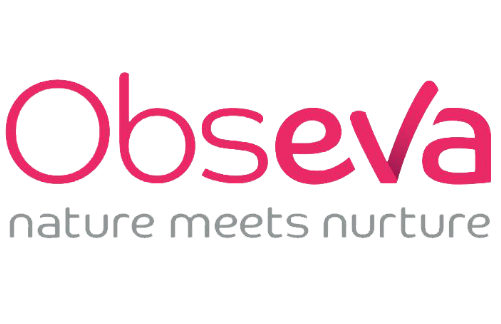
- Phase 2 nolasiban previously reported data supports potential for meaningfully increasing live birth rates in ART - Non-clinical results of OBE022 for PTL demonstrate both monotherapy/combination potential
Geneva, Switzerland and Boston, MA - 29 June 2017 - ObsEva SA (Nasdaq: OBSV), a Swiss biopharmaceutical company focused on the development and commercialization of novel therapeutics for serious conditions that compromise a woman's reproductive health and pregnancy, today announced it will make presentations at the European Society of Human Reproduction and Embryology (ESHRE) 2017 Annual Meeting, taking place July 2-5 in Geneva, Switzerland. These presentations will include the following:
• Previously reported post-hoc analysis from the dose-ranging, placebo-controlled, randomized, double-blind, Phase 2 clinical trial (IMPLANT) assessed pregnancy and live birth rates after single oral administration of a novel oxytocin antagonist, nolasiban, prior to embryo transfer (ET). The findings will be presented in an oral presentation (O-024) on Monday July 3rd, 2017 by Professor Herman Tournaye, Principal Investigator at one of the participating clinics, the Centre for Reproductive Medicine at the University of Brussels in Belgium.
"The results indicate a potential absolute increase of about 10 percent, or greater compared to placebo in pregnancy and live birth rates after administration of a single oral dose of nolasiban before ET. If confirmed in larger prospective trials, this finding has important potential for improving live birth rates following in vitro fertilization (IVF)/intracytoplasmic sperm injection (ICSI)." concluded Professor Herman Tournaye.
• Non-clinical pharmacology data showing the activity of PGF2alpha (FP) receptor antagonist, OBE022, on the inhibition of both PGF2alpha- and oxytocin-induced contractions of human pregnant myometrium strips in vitro (Poster presentation P-692, Tuesday July 4th, 2017).
• In vitro data showing the additive effect of OBE022 on the inhibition of oxytocin-induced contractions of human pregnant myometrium strips when combined with atosiban or nifedipine (Oral presentation O-119, Tuesday July 4th, 2017).
"We are pleased to have the opportunity to present to the medical community, these two sets of data from the development programs of two of our product candidates, nolasiban and OBE022." said Ernest Loumaye, MD, PhD, OBGYN, CEO and Co-Founder of ObsEva.
"The results of the IMPLANT study with nolasiban, previously reported, show a potential absolute improvement of about 10 percent, or greater in live birth rate in women undergoing assisted reproduction for infertility. This magnitude of improvement, if replicated in our ongoing, 760 patients, Phase 3, IMPLANT-2 clinical trial that we began in March of 2017, could have a significant impact on patients undergoing IVF as currently only about one out of three patients will go home with a baby after an embryo transfer.
The pharmacology data presented for OBE022 are also important as they not only indicate the potential of our compound to treat preterm labor as monotherapy but also displays additive effects with currently available treatments that have limited efficacy. We are utilizing these key data to design the Phase 2 program for OBE022 in pregnant women with preterm labor, which is scheduled to begin later this year."
About Assisted Reproductive Technology
Infertility affects about 10 percent of reproductive-aged couples, with approximately 1.6 million ART treatments (including IVF and ICSI) performed worldwide each year.
While the success of ART depends on multiple factors such as embryo quality and ET procedure, a successful pregnancy ultimately hinges on the receptivity of the uterus to accept embryo implantation. Uterine contractions at the time of ET, as well as suboptimal thickness of the uterine wall and blood flow to the uterus, may impair the implantation of the embryo.
About Nolasiban
Nolasiban (previously known as OBE001), is an oral oxytocin receptor antagonist with the potential to decrease uterine contractions, improve uterine blood flow and enhance the receptivity of the endometrium to embryo implantation, all of which may increase the chance of successful pregnancy and live-birth among patients undergoing ART. ObsEva licensed nolasiban from Merck KGaA, Darmstadt, Germany-Serono in 2013 and retains worldwide commercial rights.
About Preterm Labor
Preterm labor, defined as the birthing process starting prior to 37 weeks of gestation, is a serious condition characterized by uterine contractions, cervical dilation and rupture of the fetal membranes that can lead to preterm birth. According to a study published in the Lancet in 2012, approximately 15 million babies were born before 37 weeks of gestation in 2010, accounting for 11.1% of all live births worldwide. Over 1 million children under the age of five died in 2013 worldwide due to preterm birth complications, and many infants who survive preterm birth are at greater risk for cerebral palsy, delays in development, hearing and vision issues, and often face a lifetime of disability. The rates of preterm births are rising in almost all countries with reliable data for preterm birth, and are associated with an immense financial impact to the global healthcare system.
To date, only treatments with limited efficacy or restrictive safety issues are available to treat preterm labor. In the United States, recommended first-line tocolytic treatments (medications that inhibit labor) include beta-adrenergic receptor agonists, calcium channel blockers, or NSAIDs, which are used for short-term prolongation of pregnancy (up to 48 hours) to allow for the administration of antenatal steroids (e.g. betamethasone). Magnesium sulfate, used for fetal neuroprotection can also be used (up to 48 hours) to inhibit acute preterm labor. Approved tocolytic treatments in Europe include beta-adrenergic agonists, which carry severe maternal cardiovascular risks, and intravenous infusions of atosiban (an oxytocin receptor antagonist).
While prostaglandin inhibitors (NSAIDs) have been shown to be effective for inhibiting preterm labor, use of such drugs is limited, due to the threat of serious and sometimes life-threatening side effects in the fetus. Such side effects may include kidney function impairment, premature constriction of the blood vessel connecting the pulmonary artery and the descending aorta in a developing fetus, and higher risk of thrombosis of the intestinal arteries (a condition called necrotizing enterocolitis).
About OBE022 and PGF2alpha
ObsEva is developing OBE022, a potential first-in-class, once daily, oral and selective prostaglandin F2alpha receptor antagonist, which is designed to control preterm labor by reducing inflammation, decreasing uterine contractions, preventing cervical changes and fetal membrane rupture without causing the potentially serious side effects to the fetus seen with non-specific prostaglandin inhibitors (NSAIDs). PGF2alpha is believed to induce contractions of the myometrium and also upregulate enzymes causing cervix dilation and membrane rupture. In nonclinical studies, ObsEva has observed that OBE022 markedly reduces spontaneous and induced uterine contractions in pregnant rats without causing the fetal side effects seen with prostaglandin inhibitors such as indomethacin. ObsEva licensed OBE022 from Merck KGaA, Darmstadt, Germany-Serono in 2015 and retains worldwide commercial rights.
About ObsEva
ObsEva is a clinical-stage biopharmaceutical company focused on the clinical development and commercialization of novel therapeutics for serious conditions that compromise a woman's reproductive health and pregnancy. Through strategic in-licensing and disciplined drug development, ObsEva has established a late-stage clinical pipeline with development programs focused on treating endometriosis, uterine fibroids, preterm labor and improving ART outcomes. ObsEva is listed on The NASDAQ Global Select Market and is trading under the ticker symbol "OBSV". For more information, please visit www.ObsEva.com.
Cautionary Note Regarding Forward-Looking Statements
Any statements contained in this press release that do not describe historical facts may constitute forward-looking statements as that term is defined in the Private Securities Litigation Reform Act of 1995. These statements may be identified by words such as "believe", "expect", "may", "plan," "potential," "will," and similar expressions, and are based on ObsEva's current beliefs and expectations. These statements involve risks and uncertainties that could cause actual results to differ materially from those reflected in such statements. Risks and uncertainties that may cause actual results to differ materially include uncertainties inherent in the conduct of clinical trials and related interactions with regulatory bodies, ObsEva's reliance on third parties over which it may not always have full control, and other risks and uncertainties that are described in the Risk Factors section of ObsEva's Annual Report on Form 20-F for the year ended December 31, 2016, and other filings ObsEva makes with the SEC from time to time. These documents are available on the Investors page of ObsEva's website at obseva.com. Any forward-looking statements speak only as of the date of this press release and are based on information available to ObsEva as of the date of this release, and ObsEva assumes no obligation to, and does not intend to, update any forward-looking statements, whether as a result of new information, future events or otherwise.
Media Contact:
Liz Bryan
Spectrum Science
lbryan@spectrumscience.com
+1 202-955-6222 x2526
Company Contact:
CEO Office Contact
Delphine Renaud
delphine.renaud@obseva.ch
+41 22-552-1550
Investor Contact
Mario Corso
Senior Director, Investor Relations
mario.corso@obseva.com
+1 781-366-5726

